All the Answers
Well-known member
Truce or 36-hour strike, the options that the CGT will debate while secretly resuming contact with the Government - Infobae

Source:
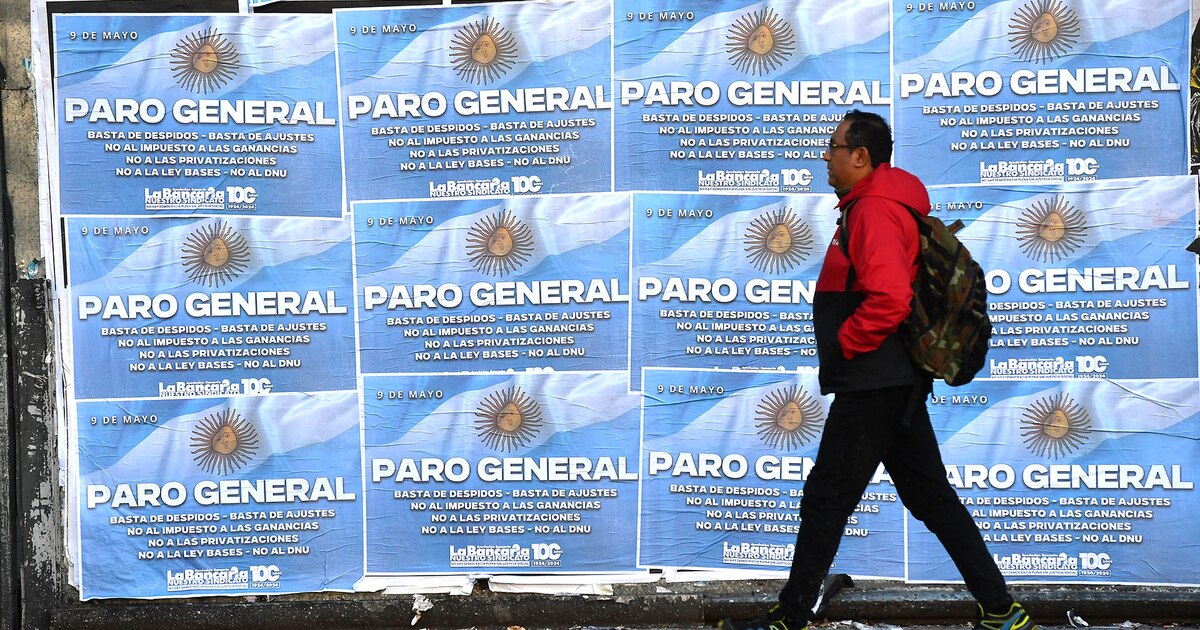
Tregua o paro de 36 horas, las opciones que debatirá la CGT mientras reanuda en secreto el contacto con el Gobierno
La mesa chica de la central obrera discutirá el martes cómo seguirá el plan de lucha y la relación con el oficialismo, mientras crece el temor por una contraofensiva libertaria para acorralar al sindicalismo. Todos hablan de una reforma laboral que nunca llega
May 12, 2024
By Ricardo Carpena
The small table of the labor union will discuss on Tuesday how the struggle plan and the relationship with the ruling party will continue, while fear grows of a libertarian counteroffensive to corner unionism. Everyone talks about a labor reform that never comes
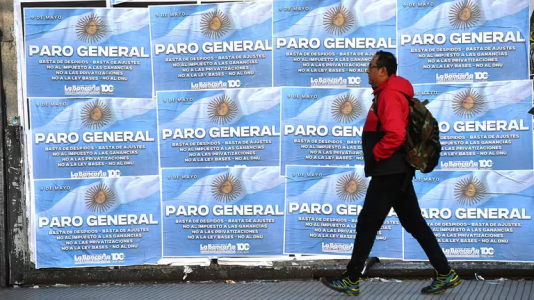
The CGT has already carried out its second general strike against the government of Javier Milei and will now debate whether to accept a truce or move towards more strikes (Photo Maximiliano Luna)
Has another stage opened in the relationship between the Government and the CGT after last Thursday's strike? There are some indications, although no one risks any prediction in this bond marked by disagreements. The day after the second general strike in five months, Cegetista leaders resumed contacts with libertarian leaders. There were promises of reserved meetings with a backdrop: the majority of union leaders want to avoid a 36-hour strike.
The threat to paralyze the country for a day and a half emerged from the left, raised by the railway worker Rubén “Pollo” Sobrero, and caught fire in Kirchnerist unionism. But the dialogue sector of the CGT, and even some Moyanistas, understand that they have no room to implement a new measure of force. “Hit to negotiate” was the motto of the metallurgical leader Augusto Timoteo Vandor at the end of the 60s to explain the strategy of protesting and then sitting down to negotiate with the dictator Juan Carlos Onganía. If the Social Works Law emerged from these negotiations, which gave unionism the assembly and administration of the union health system, why not talk to Milei now?
The CGT has already hit the Government with a record of two general strikes and three street mobilizations in 154 days of administration and also negotiated with officials, although in a sneaky manner: that is why the ruling party agreed to cut the labor reform included in the Bases Law and to make it more flexible. the refusal to approve joint ventures such as those of the Truckers Union that exceeded the official limits.
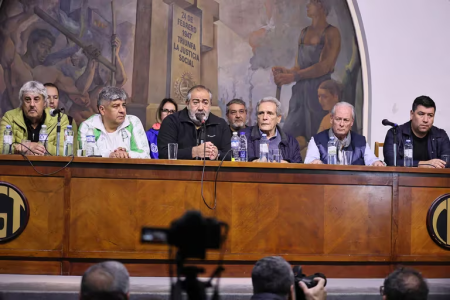
The leadership of the CGT, at the press conference held on the day of the general strike (Photo Luciano González)
No libertarian gesture was enough to shape the CGT, whose moderate faction continues to be dominated by the permanent internal party with the most combative sector, and that is why the CGT leadership demanded more changes tailored to their needs in the labor reform ( snubbing the national deputy Miguel Angel Pichetto, the operator who managed to eliminate 42 articles from the project that objected to unionism) and redoubled his strong offensive so that the Bases Law and the fiscal package founder in the Senate. In this scenario, the general strike last Thursday was impossible to lift and the Government did not even try to do so.
In addition to expressing the demands against the adjustment and the milléista reforms, the 24-hour general strike had the meaning of relief to decompress the internal tensions in the CGT and, at the same time, a demonstration of force not only towards the Government but also towards Peronism, where trade unionists aim to stop being the always forgotten ones in the political and electoral set-up.
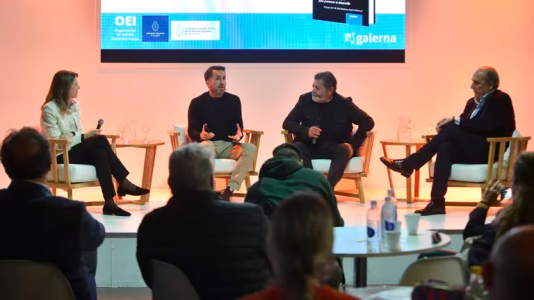
Guillermo Francos and Gerardo Martínez, together at the presentation of Gonzalo Aziz's book (Photo Gustavo Gavotti)
But there are hard-line CGT sectors that are enthusiastic about the spiral of perpetual conflict with the Government, while the more rational leadership believes that the blow represented by the general strike should be followed by the opening of dialogue with Milei. There is an urgent need not to repeat the pattern of the 13 general strikes of the CGT against Raúl Alfonsín, a symbol of union intransigence, and also the feeling that the President will not give in to many of his decisions no matter how many strikes they do.
One of the champions of the dialogue sector is Gerardo Martínez (UOCRA), despite the fact that his sector, construction, sank 42.2% in March and lost 100,000 jobs. But the Secretary of International Relations continues to appeal to dialogue to try to overcome the crisis and this Saturday, to illustrate his negotiating attitude, he shared with the Minister of the Interior, Guillermo Francos, a panel at the Book Fair to present the book “The Management of dialogue”, by journalist Gonzalo Aziz.
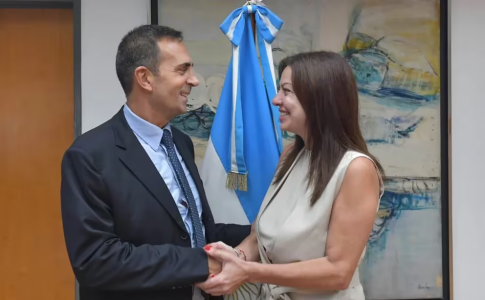
The Minister of Human Capital, Sandra Pettovello, and the Secretary of Labor, Julio Cordero
Meanwhile, the CGT small board scheduled a new meeting for this Tuesday afternoon in order to begin discussing how to continue the fight plan and the relationship with the Government. However, there is another factor that is beginning to influence the definitions: the growing fear caused by some signs that the ruling party is willing to counterattack the hostility of union power with heavy artillery .
A yellow light went on on the Cegetista board, for example, when the Secretary of Labor, Julio Cordero, issued the certificate of authorities to Dante Camaño to recognize him as head of the Capital Section of the Gastronomic Union and gave a blow to Luis Barrionuevo, leader of the union at the national level and tenacious opponent of the Milei government. The official resolution, signed the day before the CGT strike, put Barrionuevo on the warpath , who is fighting with his former brother-in-law for the Buenos Aires section, the largest and the one that raises the most, after union elections held in December. of 2021 and whose resolution remains trapped between judicial rulings and a ruling from the Supreme Court.
“If they did that to Luis, they are going to come looking for us all ,” lamented a front-line Cegetista leader, fearful of the Government's supposed counteroffensive. The first sign of union concern came when the Minister of Human Capital, Sandra Pettovello, at the request of Cordero, decided to intervene a month ago the Directorate of Union Associations of the Ministry of Labor, always suspected of files that are accelerated to benefit the union leadership. It is a strategic official agency for unionism, which usually strives to locate someone trustworthy there because it is where conflicts of organization, inspections of unions and the granting (or not) of union status or simple registration to organizations are resolved.

Luis Barrionuevo and Dante Camaño, in an endless fight, now with the suspicion of government interference
While a Human Capital team reviews folder by folder of that department to detect possible irregularities, some union leaders panicked because they believe that there is a spirit of revenge and persecution behind the intervention in Trade Union Associations, which is the same, they imagine, as supported the resolution against Barrionuevo. Even as lovers of conspiracy theories, they take for granted that libertarians are behind publications on social networks that reveal alleged assets and businesses of opposition union members and their families.
In Labor they dismiss any political intention in Cordero's decisions. They assure that the resolution in favor of Camaño was a process that was advanced and that it is based on a ruling by the Supreme Court that annulled the intervention decided by Barrionuevo to the Capital Section and reinstated his former brother-in-law in office until completing his term. mandate. What's more: they swear that the Secretary of Labor did not heed Camaño's calls and that he did not even accept his invitation to share the May 1 celebration in which the presence of Vice President Victoria Villarruel stood out. Cordero already warned the union members: “Do not bring your inmates here to me.”
There is another suspicion that some union members have: that the Government is behind the parliamentary push for the UCR deputies' bill that restores the articles of the libertarian labor reform that most affect the cash and interests of the unions. The initiative was presented last April, while the ruling party agreed to cut the labor changes of the Bases Law that irritated the CGT. Now, the union leadership was alerted by its friendly deputies that the radical initiative will begin to be discussed in commission with the nod of La Libertad Avanza.
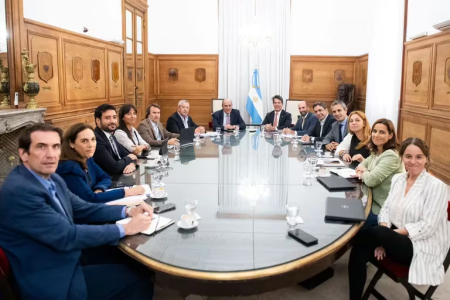
The deputies of the UCR present their labor project to ministers such as Guillermo Francos and Nicolás Posse
This project causes horror in the union ranks: it prohibits solidarity dues, key to the financing of unions with the contributions of all workers, not just members; It limits strikes in essential services such as education, puts in check the ultra-activity of collective agreements and penalizes assemblies that become covert strikes, among other points.
They will insist on radicalism with their initiative, although they admit that they are waiting to know what modifications the Senate introduces to the Base Law: as a maximum hypothesis, they do not rule out the incorporation of some articles of the labor proposal. On the PRO side they also have the expectation that, once the debate on the two laws that interest Milei most today is over, the labor reform projects presented by Cristian Ritondo and Verónica Razzini can advance , especially the one that limits the collection of the solidarity fee and the one that sanctions blockades against companies.
In any case, the versions about the promotion of the labor initiative of the UCR or the PRO seem more like a veiled threat than a possible revenge: the ruling party is still trying to get the Senate to approve the Bases Law and the fiscal package. and, given the difficulties in obtaining a majority of votes, their leaders admit that they will undergo changes and will have to return to Deputies.

Rogelio Frigerio and Facundo Moyano, together to talk about the adequacy of labor laws, among other topics
It is curious that labor reform is once again on the radar of politics and unionism like few times in recent years, but the results never materialize. The Government began with a tough proposal in this area as part of DNU 70, but it was stopped by Justice and resigned itself to a light “labor modernization”, with 42 fewer articles, to ingratiate itself with unionism.
Almost alone, the deputy secretary of the Toll Union, Facundo Moyano, has preached for four years the need to adapt labor laws to reverse more than 40% of unregistered work and now continues to seek consensus so that it is accepted to debate the “adequacy ” of labor laws: after meeting with PJ governors such as Raúl Jalil (Catamarca) and Claudio Vidal (Santa Cruz), last week he had a meeting with the PRO leader Rogelio Frigerio (Entre Ríos).
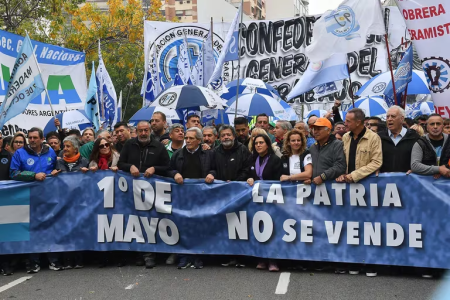
The main column of the CGT during the street mobilization for Workers' Day (Photo Maximiliano Luna)
Even the CGT, whose leaders broke out in hives every time labor reform was discussed, especially asked the Government to rename its proposal “labor modernization” and two weeks ago it very timidly presented a series of changes to labor legislation in its document “ Agenda for a new social contract.” There are new regulations on accidents at work, a first job law with tax benefits for small and medium-sized companies that hire personnel and a national program to combat precarious work, informality and child labor. Is it enough to overcome the work problems in Argentina? Probably not, but the fact that the CGT proposes to debate labor legislation is a revolution.
It would also be a revolutionary fact if the Cegetista leadership did not go against the non-Peronist governments with waves of strikes and mobilizations and were as tolerant as it was during the 4 years of Alberto Fernández and Cristina Kirchner, to whom they did not even take any forceful measures. although they left power at the end of 2019 with an accumulated inflation of 1020 percent and 40% poverty. Of course, as a counterpart, a political power that dialogues and negotiates is also needed. Thursday's strike may mark the beginning of something different. Or more than usual.

